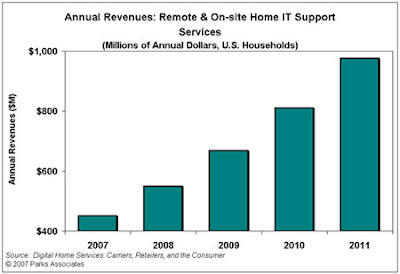Parks Associates projects that that the home technology service market will be worth nearly $1 billion by the end of 2011 (from $450 million in 2007). The market is attracting attention from the BBG (big bloated guys). AT&T, telecom industry giant, has introduced a new service called ConnecTech. ConnecTech is AT&T's venture into technical services, designed to compete with Geek Squad (Best Buy). The service is available only to residential customers in the United States. 
Another BBG (and former AT&T spinoff), Verizon (formerly Bell Atlantic) has also joined the effort to milk their name recognition. The company has launched "Expert Care", which offers tech support for computer problems and home electronics.
With the demise of CompUSA and Circuit City, there are opportunities for companies like AT&T's ConnecTech. The Circuit City brand plans to sell its trademark property to Systemax Inc., the same company that purchased CompUSA's carcass when it closed last year. Systemax, also known as Tiger Direct, closed the majority of the CompUSA brick and mortar stores, and is operating elsewhere as a web-only entity.
AT&T remains strong in computer networks, but otherwise, AT&T, once a bastion of technology (inventions, patents, and Nobel Prizes), has been reduced to a pitiful paper lion. According to a report by the scientific journal Nature, as of July 2008, only four scientists remained in the Bell Labs physics basic research group.
AT&T, the company that invented Unix (Ken Thompson, a programmer at AT&T's Bell Labs invented Unix in 1969) was otherwise a failure in the computer market, and exited this marketplace almost 20 years ago. In addition, AT&T was never a significant player in consumer electronics, the second service marketplace that ConnecTech covets.
Bureaucracies are an essential aspect of all organizations and societies; however, when bureaucracies become self-serving and self-perpetuating, this is a problem. How can the economy evolve, if bloated antiquated organizations siphon off so much energy?
AT&T is now best known for their retail stores selling phones made by someone else. AT&T hit the mother-lode with the agreement with Apple to sell the iPhone. At many stores, one must take a number to wait their turn for the privilege to buy an iPhone.
“AT&T has long been a familiar face in the homes of Americans," said Carmen Nava, senior vice president, Consumer Marketing Operations for AT&T. “The home services industry represents a billion dollar marketplace.”
AT&T has a nice website. In addition, many sporting venues, golf events, and at least two automobile races carry on the AT&T tradition.
AT&T ConnecTech Plan
AT&T has partnered with OnForce, a company comparable to Ebay (and another bureacratic layer with little real contribution), to perform liason with the contractor workforce.
to perform liason with the contractor workforce.
AT&T ConnecTech has earned the Geeks Informed Smell Test rating of Somewhat Stinky.
The AT&T ConnecTech system can sometimes resemble a Rube Goldberg machine. For example, Samsung uses AT&T ConnecTech to maintain its televisions.
the retailer calls Samsung,
who then calls AT&T ConnecTech,
who then calls OnForce,
who then (finally) submits the job for bids to find the cheapest contractor.
- Five different entities: the retailer, Samsung, AT&T, OnForce, and the local contractor each get a portion of the payment, and there is a ridiculous amount of bureacracy to wade through for the poor contractor at the end of the chain. As many customers of this system have discovered, too many cooks "spoils the broth".
A bureaucrat is the most despicable of men though he is needed as vultures are needed, but one hardly admires vultures.” Cicero
The next logical step would be for AT&T ConnecTech to add partnerships with U.S. Steel and Xerox that could provide additional prestige. This would facilitate additional bureacratic layers, and would complete the "Russian-French" model.



0 Discussion:
Post a Comment